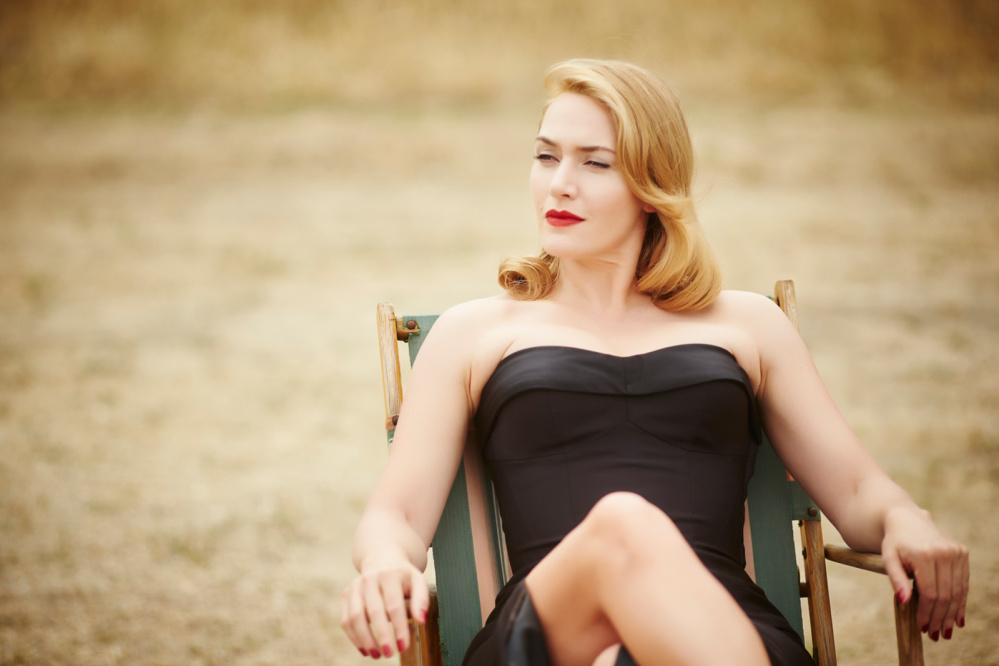“Murder’s out of tune, and sweet revenge grows harsh.”
— William Shakespeare
Dressed to the nines, Myrtle “Tilly” Dunnage (Kate Winslet), steps out of an ancient taxi cab in the pitch black darkness of Australia’s out back, plops her suitcase and a boxed sewing machine down, lights a cigarette the way Bette Davis famously did, and mutters in a low pit bull growl, “I’m back, you bastards.” And so “The Dressmaker” begins — hold your breath.
Kate Winslet, long known for taking on “ballsy” roles in her selection of parts, is back in town with a wardrobe to die for. Did I just say that?
In “The Dressmaker,” Kate, not generally know for comedy, succeeds with her biggest leap yet as Myrtle Dunnage, in a tale about a little 10-year-old girl from Dungatar, a sleepy town of about 100 folks in the middle of nowhere; imagine “Brigadoon” with its Scottish players escaped from an asylum and directed by Tim Burton.
Myrtle, who in childhood, accused of murdering a bully boy, was shipped away to Melbourne to an orphanage.
We learn that Myrtle escaped, fled to New York and then Paris, somehow got into the world of fashion, was tutored by the great Dior, and made a runway name for herself. She studied couture with the best, renamed herself “Tilly,” and rose from that childhood cocoon of desperation, and emerged as a spectacular butterfly.
Well, now she’s back, you bastards, with several scores to settle, to clear her name, and wreak sweet revenge. Brace yourselves, you’ve never seen anything like this. Would you believe that this is a “woman’s picture?” It is, and for wronged women of all ages.
“Dressmaker” is a terrific, beautifully designed dark comedy, not for everyone, just for those weary of Trump; oh! isn’t that you?
Myrtle’s mother, once famous for being the town slut, who slept with powerful folk and mechanics alike, is a piece of work.
One of her lovers is Myrtle’s father, that’s the mystery within several mysteries.
Mother is played in masterful strokes by the extraordinary Judy Davis, one of Britain’s most renowned actresses. I identify her here because it will take you half the movie to recognize her, so disguised by age is she.
The old woman, shunned by all, lives in sordid retreat in a shack atop a hill overlooking the town that rejected her.
On Tilly’s first day home, she has to clean out her mother’s hovel, burn a mountain of debris, and give mama a bath in a tub of filthy water, all while dressed in a dazzling array of outfits.
Then there’s a soccer game, which the hometown team, led by the very large, handsome captain Liam Hemsworth (”The Hunger Games” 1, 2, 3, 4) is losing. The tables are turned when Myrtle arrives with a camp chair, and wearing a skin tight scarlet taffeta dress, rattles the enemy team and shocks the villagers.
The plot thickens when Myrtle sets up shop in mama’s cleaned out hovel, and before long changes a string of hopelessly ugly ducklings into tremendous, jaw-dropping beauties. But soon, a rival dressmaker is brought to town and the real, insane, delicious fun begins.
Director Jocelyn Moorhouse along with cinematographer Donald McAlpine, skillfully fills her town with a fruit cart of fabulous comedic characters, each harboring a secret and seemingly drawn from the files of Preston Sturges, Hal Roach, Bruegel the Elder, and Tim Burton. I had no idea that the Australian film industry had such a manic stable of comic actors, but then I remembered Hugo Weaving (”The Hobbit,” “The Matrix,” and for his memorable addition to 1994’s “The Adventures of Priscilla, Queen of the Desert.”)
Weaving is here as the local gendarme, a toadying cross dressing man of the law who, once given access to Myrtle’s trunks, befriends her, and rushes around the yard in uniform and black taffeta cape.
In the end, all the mysteries, the plotters, the good and the evil are revealed to us.
The final scene, where Moorhouse borrows from a Sergio Leone spaghetti western, is with much of the film so satisfying I cannot spoil it for you.
“The Dressmaker” is drawn from Rosalie Ham’s novel, and arrives just in time for Halloween, as sweet and satisfying as candy corn.
J.P. Devine is a former stage and screen actor and the author of “Will Write for Food.”
Send questions/comments to the editors.



Success. Please wait for the page to reload. If the page does not reload within 5 seconds, please refresh the page.
Enter your email and password to access comments.
Hi, to comment on stories you must . This profile is in addition to your subscription and website login.
Already have a commenting profile? .
Invalid username/password.
Please check your email to confirm and complete your registration.
Only subscribers are eligible to post comments. Please subscribe or login first for digital access. Here’s why.
Use the form below to reset your password. When you've submitted your account email, we will send an email with a reset code.